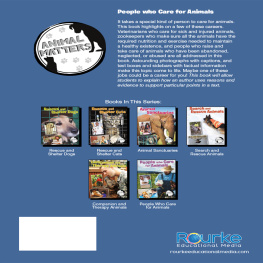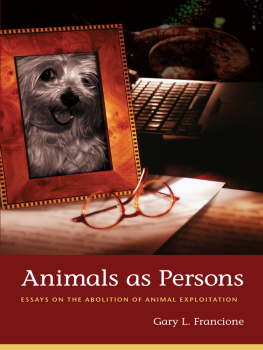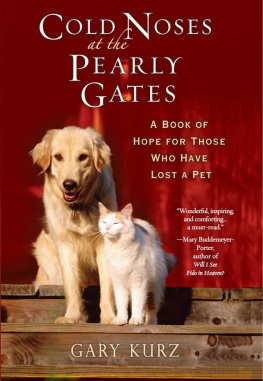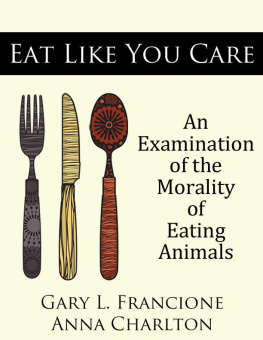Francione Gary - Eat Like You Care: An Examination of the Morality of Eating Animals
Here you can read online Francione Gary - Eat Like You Care: An Examination of the Morality of Eating Animals full text of the book (entire story) in english for free. Download pdf and epub, get meaning, cover and reviews about this ebook. publisher: Exempla Press, genre: Art. Description of the work, (preface) as well as reviews are available. Best literature library LitArk.com created for fans of good reading and offers a wide selection of genres:
Romance novel
Science fiction
Adventure
Detective
Science
History
Home and family
Prose
Art
Politics
Computer
Non-fiction
Religion
Business
Children
Humor
Choose a favorite category and find really read worthwhile books. Enjoy immersion in the world of imagination, feel the emotions of the characters or learn something new for yourself, make an fascinating discovery.
- Book:Eat Like You Care: An Examination of the Morality of Eating Animals
- Author:
- Publisher:Exempla Press
- Genre:
- Rating:5 / 5
- Favourites:Add to favourites
- Your mark:
- 100
- 1
- 2
- 3
- 4
- 5
Eat Like You Care: An Examination of the Morality of Eating Animals: summary, description and annotation
We offer to read an annotation, description, summary or preface (depends on what the author of the book "Eat Like You Care: An Examination of the Morality of Eating Animals" wrote himself). If you haven't found the necessary information about the book — write in the comments, we will try to find it.
Francione Gary: author's other books
Who wrote Eat Like You Care: An Examination of the Morality of Eating Animals? Find out the surname, the name of the author of the book and a list of all author's works by series.
Eat Like You Care: An Examination of the Morality of Eating Animals — read online for free the complete book (whole text) full work
Below is the text of the book, divided by pages. System saving the place of the last page read, allows you to conveniently read the book "Eat Like You Care: An Examination of the Morality of Eating Animals" online for free, without having to search again every time where you left off. Put a bookmark, and you can go to the page where you finished reading at any time.
Font size:
Interval:
Bookmark:
An Examination of the Morality of Eating Animals
Gary L. Francione
Anna Charlton
EXEMPLA PRESS
Copyright
2013 by Gary L. Francione & Anna Charlton.
All rights reserved.
First Edition
ISBN: 978-0-9896167-0-6
Published by Exempla Press
Exempla is the plural of exemplum, or a story, which could be real or fictitious, used to make a moral point. Exemplary literature was a genre that was popular in classical, medieval, and Renaissance literature.
Dedicated to the approximately 57 billion land animals and one trillion aquatic animals we will consume in the next year.
So much suffering .
So much death.
All so unnecessary .
All so wrong .
Thanks so much to Sarah K.Woodcock for her excellent editorial and production assistance. Her contributions were considerable and her dedication to the project from beginning to end never wavered.
Thanks also to Aruna Lopez and Melissa Resnick for their assistance and editorial suggestions.
The number of animals used for food is overwhelming . According to the United Nations Food and Agricultural Organization, humans kill more than 57 billion animals a year for food. One billion is a thousand million. This number does not include the number of fish and other aquatic animals we consume. That number is estimated to be at the very least another one trillion. One trillion is a million million .
Thats an absolutely staggering amount of suffering and death.
If you are like most people, you like animals. In fact, you may even think of yourself as an animal lover. But you also probably eat meat, dairy, eggs, and other animal products.
Youve thought about this and it has troubled you. You suspect that the process of raising and slaughtering animals is pretty brutal and you arent sure about how you should respond.
Most of us, when we were children, were horrified to learn that we were eating animalsbeings who, at least in an abstract sense, we loved. In order to assure us, our parents told us one story or another, such as that God wanted us to eat animals or that we would be weak and ill if we did not consume animal products and so we grew comfortable with eating them.
As we got older, we kept our moral quiescence on the matter by convincing ourselves of the many excuses that are explored in this book. The prevalence of these excuses, together with the fact that they dont really satisfy us, establishes very clearly that we know something is not right here.
And now there is a move afoot to address our concerns by offering us free-range this, cage-free that, and a whole range of other happy meat and animal products. Is this the answer? Is the answer to continue consuming animal products that are supposedly humanely produced? Or is our childhood reaction to this whole enterprise the right reaction? Should we stop consuming animal products altogether?
What are we to think about the issue of consuming animals and animal products? Its all so perplexing.
The purpose of this book is to try to make this matter less perplexing.
We are going to defend a simple proposition:
If animals matter morally at all , we cannot consume them or products made from them and we are committed to a vegan diet, or a diet of vegetables, fruits, grains, beans, nuts , and seeds, and excluding all meat, fish, milk, cheese, other dairy products, and eggs.
We are not going to present a general argument for animal rights.
We are not going to defend the notion that animals and humans have equal moral value.
We are going to focus on two principles that you and everyone else already accept and we hope to demonstrate that, based simply and solely on these two principles, we cannot justify consuming animal products. These principles commit us to a vegan diet.
These principles, which are widely-shared moral intuitions and constitute our conventional wisdom about animal ethics, are as follows:
The first principle is that we have a moral obligation not to impose unnecessary suffering on animals.
No one doubts that.
We could, of course, have an interesting and lengthy discussion about what necessity means and when suffering or harm is necessary. But determining what necessity means as an absolute matter isnt necessary for our purposes.
All that is necessary is that we all agree on what is not necessary: we all agree that it is not necessary to inflict suffering on animals for reasons of pleasure, amusement, or convenience.
So although we might disagree about whether particular instances of animal suffering are necessary, we would all agree that suffering imposed on animals solely because it brings us pleasure, or because we find it amusing or convenient, is not necessary.
The second principle is that although animals matter morally, humans matter more.
Some of us think that humans matter more because they are made in the image of God and have souls. Some of us may not believe in God at all, but still think that humans matter more generally or because they have certain abilitiesthey can write symphonies or poetry, paint pictures, or design buildings or bombs.
It really doesnt matter why most of us think that humans matter more and it doesnt matter whether that idea can be defended. Although we think that there are compelling reasons to challenge and reject this notion--and we have done so in our other writing setting out and defending a comprehensive theory of animal rights--we will, for present purposes, just assume that it is true.
A corollary of this second principle is that if there is a conflict that necessitates deciding between a human and a nonhuman, we must favor the interests of the human. For example, if we are on a lifeboat with another human and a dog, and we are confronted with some emergency that compels us to throw one overboard, the dog loses. The dog matters but the human matters more.
We would submit that there is virtually no one who would disagree with these two principles or doubt that they are widely-shared moral intuitions. Yes, there are some people who have no moral concern for animals. But so what? There are some people who have no moral concern for other humans. Just as that fact does not negate our moral concern for other humans, the fact that some people have no moral concern for animals does not negate the fact that most people do and those who have no concern represent a minority view. Nearly everyone regards animals as having some moral value and does not regard them merely as things.
So lets recap. We maintain that our conventional wisdom about animals is:
We have a moral obligation not to impose unnecessary suffering on animals; suffering imposed for mere pleasure, amusement, or convenience is, by definition, unnecessary.
Animals have some moral value but humans matter more than nonhumans; in a situation of conflict between a human and an animal, the animal loses.
We will not challenge these widely-shared moral intuitions. Well leave them in place and well show you that if you agree with them, they compel you to stop consuming animal products without even thinking about animal rights, much less embracing that notion.
In sum, we hope to persuade you that what you already believe commits you to a plants onlyor vegandiet.
First, if you presently consume animal products, you may feel as though were attacking you. Were not and we dont want you to feel as though we are.
Consuming animal products has been considered normal by most of us for all of our lives. We all have fond memories of family and friends at holidays and other special occasions, and there were always animal foods of various sorts served.
Font size:
Interval:
Bookmark:
Similar books «Eat Like You Care: An Examination of the Morality of Eating Animals»
Look at similar books to Eat Like You Care: An Examination of the Morality of Eating Animals. We have selected literature similar in name and meaning in the hope of providing readers with more options to find new, interesting, not yet read works.
Discussion, reviews of the book Eat Like You Care: An Examination of the Morality of Eating Animals and just readers' own opinions. Leave your comments, write what you think about the work, its meaning or the main characters. Specify what exactly you liked and what you didn't like, and why you think so.








